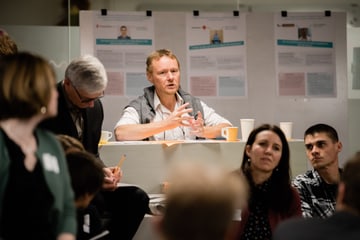Innovation is a must for NGOs
Thierry Agagliate, Head of Innovation at Terre des Hommes, understands innovation not just as an invention or a new idea but also as a working solution that represents a new way of addressing a problem. His wish? That NGOs consider innovation as an absolute must to make the best use of their scarce resources.

The origin of this blog article
At cinfo's 2019 Immersion Day "Shaping the organisation of the future", we asked 14 professionals why and how their organisations have taken the path of transformation. Their stories were told in different workshops on the topics of user-centric projects, new HR, digital tools and leadership.
Check out the 14 inspiring stories
After several positions as country and regional director, Thierry Agagliate helped Terre des Hommes to set up an innovation unit in 2016, which he now leads. He understands innovation not just as an invention or a new idea but also as a working solution that represents a new way of addressing a problem. His wish? That NGOs consider innovation as an absolute must to make the best use of their scarce resources. They should take the private sector, where innovation is an essential competitive advantage, as a source of inspiration. “We NGOs were all created by social innovators – but our organisations are now functioning like machines with similar (almost packaged) projects.”
Thierry considers himself as an early believer in the potential of digital tools for development. What is the link between digitalisation and innovation? “Digitalisation is the context. It causes a global transformation of our economies, our production capacities and our learning abilities. Digitalisation is an infrastructure with the potential to trigger radical changes in power dynamics, in the relationship with beneficiaries, in our projects’ outreach and capacity for leverage, in the intelligence provided by data”.
Today, the most successful innovation at Terre des Hommes is in the field of digital health and aims at strengthening primary health care in rural areas in West Africa. Used on digital tablets, the tool, called “Integrated eDiagnostic approach”, guides health personnel to accurately diagnose sick children. Data is stored and processed for analysis, reporting and quality control improvements. The project has improved the quality of care for 2.5 million children in Africa. “This innovation is the outcome of an iterative process that started about 10 years ago”, says Thierry.
What are the qualities of an innovator? Although there are some characteristics which foster innovation – entrepreneurship, creativity, a capacity to connect dots and intrinsic motivation – Thierry believes that no-one can consider themselves as an individual innovator. The capacity to innovate arises from the combination of mindsets and skills. “I am lucky to work with a complementary team – only together can we achieve good results”, he concludes.
Our organisations were created by social innovators. But let’s be honest: we are not innovative anymore.



